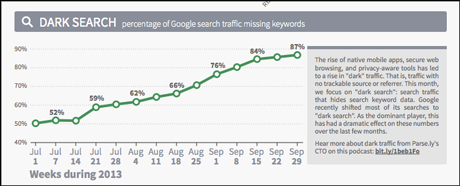
A new study by analytics platform Parse.ly demonstrates the rise of "dark search", where there is hidden referrer information such as keyword data.
"The rise of native mobile apps, secure web browsing, and privacy-aware tools has led to a rise in "dark" traffic," the Parse.ly authority report states.
"Google recently shifted most of its searches to 'dark search'," the report states. "As the dominant player, this has had a dramatic effect on these numbers over the last few months."
The report finds that 87 per cent of referrals from Google are now dark.
Journalism.co.uk highlighted dark search in this podcast and feature, which both include an interview with Parse.ly co-founder and chief technology office Andrew Montalenti.
In the feature he explained how DuckDuckGo, a search engine that does not track users in the way Google does and strips all referral information, has also contributed to the rise in dark search.
"DuckDuckGo has had a big surge in popularity post the Snowden and NSA scandal as people are interested in searching online without being tracked," Montalenti said in the podcast. "Publishers that get featured in that search engine still show up as direct traffic and it is not social."
Charting dark search
The below chart is taken from the report and shows the rise in dark search between July and September.

Other analytics
The report, which analysed data from "hundreds of online publishers" and "billions of page views", shows search is the dominant traffic driver, providing 46 per cent of traffic to news sites in July and September. Other news sites provided 18 per cent of news site traffic, social networks provided 17 per cent of hits, aggregators 8 per cent, RSS readers 1 per cent, with 10 per cent uncategorised.
Feedly remained the most popular RSS reader driving traffic to news sites that use Parse.ly. This was also demonstrated in the last Parse.ly authority report.
MSN, Drudge Report and Reddit are the top three aggregators driving news site referrals. Facebook, followed by Twitter and then Pinterest are the top three social referrers.
Free daily newsletter
If you like our news and feature articles, you can sign up to receive our free daily (Mon-Fri) email newsletter (mobile friendly).
Related articles
- Audiences, AI and audio apps: five talking points from Perugia
- Protecting independent journalism, with Lexie Kirkconnell-Kawana of IMPRESS
- Why Australia's bid to make big tech pay for news failed: views from an indie publisher
- Five key takeaways from the UK select committee on the future of news
- Finding purpose for AI in the newsroom









